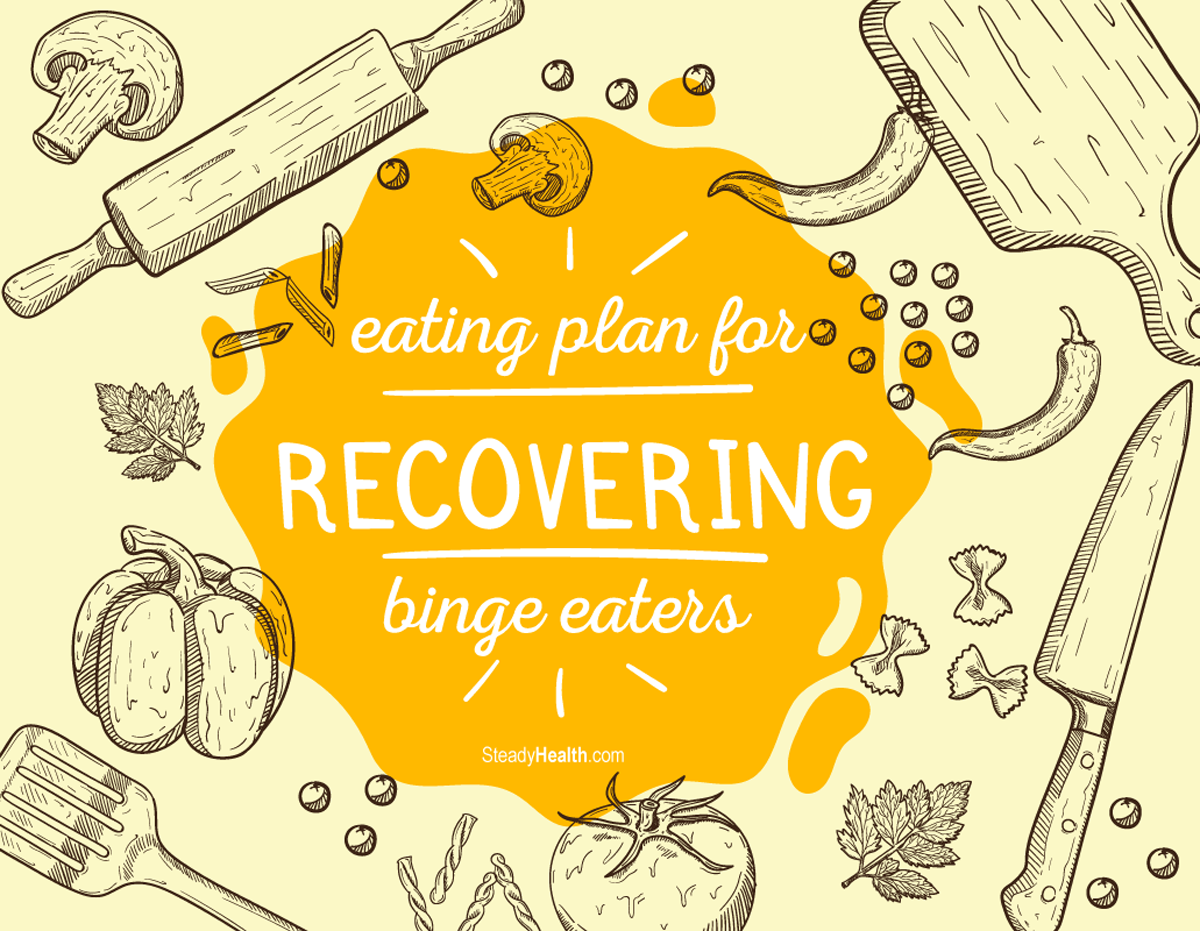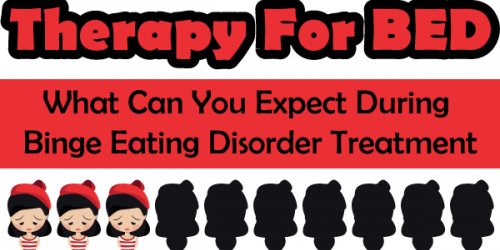
Changing your eating habits is an essential part of recovering from binge eating disorder. What kind of therapeutic eating plan will you benefit from most during your recovery from binge eating disorder?
The ideal treatment of binge eating disorder comprises a whole team of experts — on their road to recovery, binge eaters may see a psychologist, psychiatrist, medical doctor, and nutritionist or dietician [1].
Depending on the severity of your binge eating disorder and your level of access to medical care, your binge eating disorder treatment may, however, not be ideal. You could be stuck on a waiting list, with a therapist who doesn't know much about nutrition, or reading online articles in a bid to recover from binge eating disorder on your own. None of those things mean there is nothing you can do by yourself, right now.
Regardless of the binge eating disorder treatment you may or may not be receiving, you'll have questions about how and what to eat if you are hoping to recover from binge eating disorder. Lots of questions, in fact.
What is the best therapeutic eating plan for binge eating disorder sufferers? When should you eat? What should you eat? How can you avoid binge eating episodes?
These questions are important, but they have no easy answers because recovering from binge eating disorder is about more than following a rigid meal plan. There are, however, important steps you can take that will help you during the treatment of binge eating disorder.

Binge eating disorder is characterized by compulsive overeating. You'll be used to eating large amounts of food in a short period of time, even when you are not hungry or when you are already uncomfortably full, you'll likely be used to eating very quickly, and you may be used to eating at unpredictable times. As someone with binge eating disorder, you are likely to be prone to eating alone, and to hiding your eating habits from others. [2] Most people with binge eating disorder are also overweight or obese [3].
Along with resolving the underlying issues that led to your binge eating disorder — issues like low self-esteem, stress, peer influence, and coming from a family where food was a difficult subject [4], embracing healthy eating habits is one of the main aims of binge eating disorder treatment. This doesn't simply mean following a rigid meal plan, however, but rather gradually getting used to eating normal amounts of foods that meet your nutritional needs.
Early on in your binge eating disorder therapy, limit your food intake to three regular meals and two or three planned snacks a day, and no eating in between. During your meals, you want to pay close attention to how you feel, and to stop eating when you are satisfied. You want to set regular mealtimes, but avoid making them so inflexible that you cannot make adjustments if unplanned activities come up. [5]
Your meals should meet and not exceed your nutritional needs, and the same meals that are healthy for everyone else are good for you, as a recovering binge eater, as well.
You will want to eat a diet that is:
The therapeutic eating plan for binge eating recovery that you eat shouldn't be a nightmare — it is important to include foods that you enjoy. [9]
Adult women need between 1,800 and 2,400 calories depending on their level of physical activity, while adult men require between 2,200 and 3,000 calories a day [10]. If you are overweight or obese and hoping to lose weight during your recovery from binge eating disorder, you can reduce your caloric intake by 500 to 1000 calories a day to lose up to two pounds a week [11]. You will, however, need to consult a dietician to determine the optimal number of calories for you during the treatment of binge eating disorder, and will be taught to focus on nutrition rather than obsessive calorie counting.
Good meals should feature protein, starches, vegetables, and some healthy fat.
For breakfast, you could choose:
For lunch, you could choose:
For dinner, you could have:
Snack time, which you should plan up to three times a day, can feature:
Also keep in mind that using smaller plates makes it seem like you have more food, and that sitting at the dinner table without any distractions makes it harder to overeat than sitting in front of the TV.
Replace sugary drinks or heavily sweetened tea and coffee with plain water, unsweetened tea and coffee, or water with a little lemon and cucumber.
As a recovering binge eater, you will be experiencing food cravings that will make you want to eat more than those three planned meals and snacks — and you can circumvent them by engaging in activities during which you cannot eat, or get through them [5]. The advice given to recovering smokers and drinkers can help you with this:
Regular exercise takes your mind off overeating during your binge eating disorder treatment, encourages weight loss, and promotes general health. You should be engaging in moderate aerobic exercise, such as brisk walking, for two and a half hours a week in addition to strength training that works on all major muscle groups at least twice a week. Consider joining a gym or sports class during your treatment for binge eating disorder.
If you're reading this, you're either preparing for full professional mainstream therapy or alternative treatment for binge eating disorder, informing yourself about binge eating disorder treatment because a loved one is going through it, or you have binge eating disorder and you are wondering whether you can overcome it by yourself.
If you fall into that last category, and recovering from binge eating disorder by yourself is harder than you thought it would be, you may want to know that even if treatment at an eating disorder clinic is not currently possible for you, guided-self help therapy may be an option, and drugs used to treat binge eating disorder may be a prescription away. Home treatment for binge eating disorder, with herbs, may complement your eating plan as well.


Therapy For Binge Eating Disorder: What Can You Expect During Binge Eating Disorder Treatment?
 Binge-Eating Disorder: The Forgotten Eating Disorder
Binge-Eating Disorder: The Forgotten Eating Disorder Binge There, Done That: Comfort Eating vs Binge Eating Disorder
Binge There, Done That: Comfort Eating vs Binge Eating Disorder Binge-Eating Disorder: Causes, Symptoms, Diagnosis, Complications And Treatment
Binge-Eating Disorder: Causes, Symptoms, Diagnosis, Complications And Treatment Home Treatment For Binge Eating Disorder: 21 Natural Treatments And Herbs
Home Treatment For Binge Eating Disorder: 21 Natural Treatments And Herbs How To Practice Healthy Eating Habits When You Suffer From An Eating Disorder
How To Practice Healthy Eating Habits When You Suffer From An Eating Disorder Binge Eating Disorder Treatment: Is Mainstream Or Alternative Your Best Bet For Getting Better?
Binge Eating Disorder Treatment: Is Mainstream Or Alternative Your Best Bet For Getting Better? Fatigue And Eating Disorders: 4 Reasons You Always Feel Tired
Fatigue And Eating Disorders: 4 Reasons You Always Feel Tired What Drugs Are Used To Treat Binge Eating Disorder?
What Drugs Are Used To Treat Binge Eating Disorder? Kids Get Eating Disorders Too: Could Your Child Have Anorexia, Bulimia, Or Binge Eating Disorder?
Kids Get Eating Disorders Too: Could Your Child Have Anorexia, Bulimia, Or Binge Eating Disorder? What Are The Health Consequences And Medical Complications Of Binge Eating Disorder?
What Are The Health Consequences And Medical Complications Of Binge Eating Disorder? Signs You May Be Suffering From An Eating Disorder
Signs You May Be Suffering From An Eating Disorder 7 Warning Signs And Symptoms You Are Suffering From An Eating Disorder
7 Warning Signs And Symptoms You Are Suffering From An Eating Disorder How To Help A Child Or Teen Who Has An Eating Disorder
How To Help A Child Or Teen Who Has An Eating Disorder OSFED: Why You've Never Heard Of This Common Eating Disorder
OSFED: Why You've Never Heard Of This Common Eating Disorder Does your teen have an eating disorder?
Does your teen have an eating disorder? How To Diagnose Eating Disorders: 3 Assessment Tools And Tests Your Doctor May Use
How To Diagnose Eating Disorders: 3 Assessment Tools And Tests Your Doctor May Use Pica: Not Your Usual Eating Disorder
Pica: Not Your Usual Eating Disorder Eating Disorders: 10 Things You Should Not Miss About Purging Disorder
Eating Disorders: 10 Things You Should Not Miss About Purging Disorder